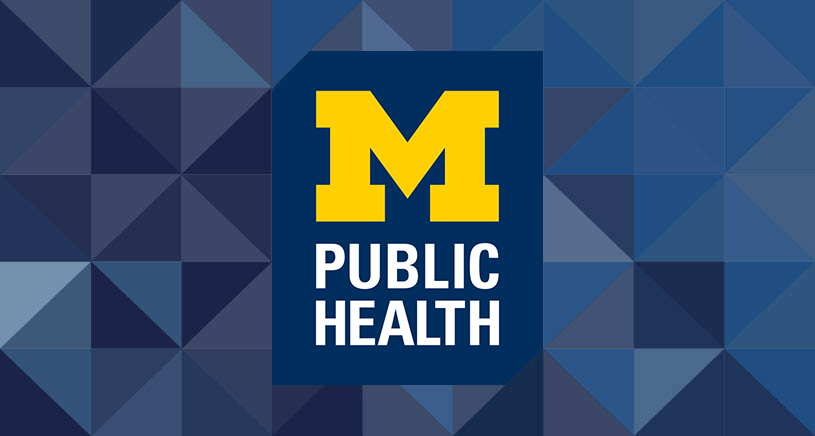Epidemiology Courses
EPID299: Independent Research for Undergraduates
- Graduate level
- Residential
- Fall, Winter term(s) for residential students;
- 1-3 credit hour(s) for residential students;
- Instructor(s): Sara Adar (Residential);
- Offered Every semester
- Prerequisites: Perm. Instr.
- Description: Students do an independent microbiology research project under the supervision of afaculty member in the Hospital and Molecular Epidemiology program.
- Learning Objectives: Students learn both specific laboratory techniques and in general how to carryout independent research.

EPID399: Independent Research for Undergraduates
- Graduate level
- Residential
- Fall, Winter term(s) for residential students;
- 1-3 credit hour(s) for residential students;
- Instructor(s): Staff (Residential);
- Offered Every semester
- Prerequisites: Perm. Instr. and at least Junior status
- Description: Students do an independent microbiology research project under the supervision of a faculty member in the Hospital & Molecular Epidemiology program.
EPID504: Polymicrobial Communities Laboratory
- Graduate level
- Residential
- Fall term(s) for residential students;
- 3 credit hour(s) for residential students;
- Instructor(s): Alex Rickard (Residential);
- Offered Every Fall
- Prerequisites: Permission of the Instructor
- Description: This laboratory course provides an opportunity for students to become familiar with approaches and techniques to studying microbial diversity. Techniques to describe microbial diversity at the structural, behavioral, and ecosystem level will be addressed. Emphasis will be placed on approaches to understand diversity within the human microbiome and environmental systems as well as the interactions between them.
- Learning Objectives: Three learning objectives include: (1) Learn and perform laboratory techniques to describe microbial diversity as well approaches to analyze the results of experiments. (2) Realize the impact microbes on the environment as well as on the human microbiome and understand how these communities may interact with one-another. (3) Participate in a scientifically-based class debates and contribute towards the formulation of laboratory experiments.
- This course is cross-listed with Pilot course so not yet cross-listed but upper-level undergraduate students and graduate students from other departments will be considered. in the Pilot course so not yet cross-listed but upper-level undergraduate students and graduate students from other departments will be considered. department.

| Department | Program | Degree | Competency | Specific course(s) that allow assessment | EPID | Hospital and Molecular Epidemiology | MPH | Demonstrate sterile technique and an understanding of fundamental lab safety measures | EPID504 |
|---|
EPID505: Polymicrobial Communities in Human Health and Disease
- Graduate level
- Residential
- Fall term(s) for residential students;
- 3 credit hour(s) for residential students;
- Instructor(s): Alex Rickard (Residential);
- Last offered Fall 2019
- Not offered 2024-2025
- Prerequisites: None
- Undergraduates are allowed to enroll in this course.
- Description: Regions of focus for the study of the human microbiome (image taken from http://nihroadmap.nih.gov/hmp/ ) This course provides an opportunity for students to become familiar with the concept that humans contain more than just an organized assemblage of mammalian cells. In addition to our human cells, there are numerous microbial inhabitants- many are bacteria. Indeed, on a per-cell basis, these bacteria outnumber human cells by at least an order of magnitude. How resident bacteria interact with one another and with transient (often pathogenic) bacterial species is important to understand because these interactions can promote health or potentially aid the transition towards disease. One such example of these interactive polymicrobial communities can be found in dental plaque, where 400 species of bacteria can cohabitate, and their physical and chemical interactions play a role in the colonization of pathogenic species. In this case, disease can be manifested as periodontitis. Other examples of microbial communities of the body that will be studied in this course include skin/wounds, the upper-respiratory tract, the gut and the urogenital tract. Overall, this course will describe the microbial ecology of the human body and driving forces promoting the transition from those communities associated with health to disease-causing communities. Special emphasis will be given to cutting-edge laboratory techniques when exploring the microbial ecology of the human body. This course will culminate with a broad overview of the current understanding of the human microbiome and potential associated social ramifications of future research.
- Learning Objectives: Four learning objectives include: (1) Learn about the complexity of the human microbiome and techniques that are available to study the ecology of human-associated microbial communities. (2) Realize the impact of the microbial inhabitants of humans on health and disease and be able to describe microbial factors that promote the transition towards diseased states. (3) Participate in a scientifically-founded class debate: Addressing the legal, ethical and social ramifications raised by research into the human microbiome. (4) Understand cutting-edge research and review articles discussing results of investigations of the human microbiome. Furthermore, each student will use these articles to develop a paper which outlines a plan to study the ecology of host-associated microbial communities in health and/or disease.

EPID506: Health of Nations: Introduction to International Health
- Graduate level
- Residential
- Fall term(s) for residential students;
- 3 credit hour(s) for residential students;
- Instructor(s): Marie O'Neill (Residential);
- Offered every year
- Prerequisites: Grad Status
- Description: This course presents an overview of mortality and disease occurrence in terms of geographic, cultural, nutritional and environmental factors. Reviews health indicators such as infant mortality and economic factors associated with development. Discusses health problems of developing countries and describes programs and organizations involved in addressing them. This course is required for students in the International Health track in Epidemiology but can also be taken by non International Health students.
- Syllabus for EPID506

| Department | Program | Degree | Competency | Specific course(s) that allow assessment | EPID | Global Health Epidemiology | MPH | Explain the history and key initiatives of global health, how health and development strategies interact, and the role of cross-sector organizations in global health governance and practice | EPID506 | EPID | Global Health Epidemiology | MPH | Utilize health data from low- and middle-income countries to assess the global burden of disease, associated risk factors and health trends, and scope and limitations of available data | EPID506 | EPID | Global Health Epidemiology | MPH | Apply the steps in developing research infrastructure for population health studies in low- and middle-income countries, including consideration of local ethics and IRB review | EPID506, EPID664 | EPID | Global Health Epidemiology | MPH | Demonstrate contextual expertise in at least one country/region including knowledge of the structure of health systems and the public health infrastructure, as well as major public health intervention programs | EPID665, EPID506 |
|---|
EPID511: Introduction to Public Health Genetics
- Graduate level
- Residential
- Fall term(s) for residential students;
- 3 credit hour(s) for residential students;
- Instructor(s): Staff (Residential);
- Offered Every Fall
- Prerequisites: Grad status or perm instructor
- Description: This course is designed for those interested in a basic understanding of human genetics who have had only a very limited exposure to biologic sciences. This course will cover the basics of genetics at both the molecular and population level. In addition to the basic science, some ethical, legal, and social implications of genetics research will be examined. Examples relevant to public health will be emphasized.
- This course is cross-listed with in the PUBHLTH 311 department.
- Syllabus for EPID511
EPID512: Biologic Basis Of Disease
- Graduate level
- Residential
- Winter term(s) for residential students;
- 3 credit hour(s) for residential students;
- Instructor(s): Kelly Bakulski (Residential);
- Offered Every Fall
- Last offered Fall 2021
- Prerequisites: None
- Description: This course is taught from an epidemiologic perspective and emphasizes the application of biologic knowledge for public health. Specifically, students will practice skills to develop biology-informed research questions, evaluate physiology-informed approaches to measure health outcomes, and interpret epidemiologic study results in the context of disease pathways.
- Learning Objectives: 1. You will be able to relate the structure and function of organ systems in the human body. 2. You will be able to evaluate biomarker measures of physiologic function, disease, and treatment response for use in epidemiologic studies. 3. You will be able to understand physiologic mechanisms of major diseases to inform research, treatment, and prevention. 4. You will be able to characterize the biologic links between risk factors and major diseases and explain biologic factors that affect a population’s health. 5. You will apply knowledge to develop novel and testable epidemiologic research questions in the context of physiology. 6. You will be able to interpret results from epidemiologic studies in the context of the physiology of that system. 7. You will be able to discuss the science of primary, secondary and tertiary prevention in population health.
- Syllabus for EPID512

EPID513: Vaccine in Public Health
- Graduate level
- Residential
- Fall term(s) for residential students;
- 3 credit hour(s) for residential students;
- Instructor(s): Zhenhua Yang (Residential);
- Prerequisites: PUBHLTH370 or EPID512
- Description: This course introduces essential vaccinology, covering pre-clinical vaccine development, clinical trials, new vaccine licensing, immunization program design and evaluation. It also introduces population transmission dynamics concepts, and the impact of pathogen and human population diversity on vaccination. Recent advancements in major types of non-infectious vaccines will also be discussed.
- This course is cross-listed with in the PUBHLTH413 department.
- Syllabus for EPID513

EPID514: Social Epidemiology
- Graduate level
- Residential
- Fall term(s) for residential students;
- 3 credit hour(s) for residential students;
- Instructor(s): Miatta Buxton (Residential);
- Offered Every Fall
- Last offered Fall 2021
- Prerequisites: EPID 503 (or equiv), Biostat 503 (or equiv)
- Description: Considers the uses of epidemiology with emphasis on the social determinants of chronic diseases and premature mortality. Theoretical as well as methodological issues in conducting social epidemiology research are emphasized. Designed for graduate students who have prior familiarity with the basic principles and methods of epidemiologic research.
- Syllabus for EPID514

EPID515: Genetics in Public Health
- Graduate level
- Residential
- Fall term(s) for residential students;
- 3 credit hour(s) for residential students;
- Instructor(s): Jennifer Smith (Residential);
- Offered Every Fall
- Prerequisites: None
- Description: This course is designed for students with biology or genetics background, that are interested in understanding genetics in public health. This course will provide an in depth examination of genetics in public health including newborn screening diseases and practices, fundamentals of population genetics, and the genetics of common chronic diseases.
- Syllabus for EPID515

EPID516: Genomics in Epidemiology
- Graduate level
- Residential
- Winter term(s) for residential students;
- 4 credit hour(s) for residential students;
- Instructor(s): Jennifer Smith (Residential);
- Offered Every Winter
- Prerequisites: Epid 503 or equivalent; Epid 515 or equivalent; Biostat 503 or equivalent
- Description: This course relates genomics to the core public health discipline of epidemiology emphasizing the use of genomics to help describe disease frequency and distribution and to gain insights into biological etiologies. Topics include genetic material in disease, in families and in populations; the investigation of multifactorial traits; model-based linkage analysis; model-free linkage analysis; segregation analysis; allele association and linkage disequilibrium; and gene-gene interactions and gene-environment interactions. Issues related to implementing studies are considered.
- Syllabus for EPID516

EPID521: Introduction to Geographic Information Systems for Public Health Research
- Graduate level
- Residential
- Winter term(s) for residential students;
- 1 credit hour(s) for residential students;
- Instructor(s): Peter Larson (Residential);
- Offered Every Winter
- Prerequisites: EPID600
- Description: This course is a practical guide for how to use GIS in your work as a public health professional and will provide an understanding for why incorporating geography into study design is critical to the translation of research findings into effective health policy.
- Learning Objectives: Foundational Learning Objective: Explain the critical importance of evidence in advancing public health knowledge.

EPID525: Clinical and Diagnostic Microbiology
- Graduate level
- Residential
- Winter term(s) for residential students;
- 3 credit hour(s) for residential students;
- Instructor(s): Paul Lephart (Residential);
- Prerequisites: At least 1 prior microbiology course or permission of the instructor
- Description: This course describes methods used by clinical and public health microbiologists to detect clinically relevant microorganisms in patient specimens, and how this information is used in patient management. Students will gain an understanding of processes by which microbiology data is generated and its relevance to clinicians and epidemiologists.
- Syllabus for EPID525
EPID530: Public Health Communication With Diverse Audiences
- Graduate level
- Residential
- Fall term(s) for residential students;
- 1 credit hour(s) for residential students;
- Instructor(s): Ella August (Residential);
- Offered Every Fall
- Prerequisites: none
- Description: Students will learn the structure, conventions, and styles associated with selected communication formats, appropriate for scientific discourse in public health. During the course, students will produce a scientific poster with a "conference-style" abstract, develop and present an oral presentation and explore one practice-oriented writing format in depth.
- Syllabus for EPID530

EPID543: Epidemiology of Viral Diseases
- Graduate level
- Residential
- Fall, Winter term(s) for residential students;
- 3 credit hour(s) for residential students;
- Instructor(s): Emily Martin (Residential);
- Prerequisites: Graduate Standing or BIO 207 & BIO 305
- Undergraduates are allowed to enroll in this course.
- Description: The nature of viruses including replication, transmission, pathogenesis, pathology, antigenic relationships and preventive measures
- Syllabus for EPID543

EPID565: Research in Hospital and Molecular Epidemiology
- Graduate level
- Residential
- Fall, Winter, Spring, Summer term(s) for residential students;
- 1-6 credit hour(s) for residential students;
- Instructor(s): Emily Martin (Residential);
- Offered every year
- Prerequisites: Perm. Instr.
- Description: Investigation of a selected problem planned and carried out by each student. Pertinent literature, investigational approaches, and progress in the investigations are discussed in seminars. May be taken more than once for up to six credits. Usually taken first for one credit. This is the Capstone Course for Hospital and Molecular Epidemiology Students.
- Syllabus for EPID565

EPID582: Molecular Epidemiology And Pathogen Genomics
- Graduate level
- Residential
- Winter term(s) for residential students;
- 3 credit hour(s) for residential students;
- Instructor(s): Evan Snitkin (Residential);
- Offered Every Winter
- Prerequisites: None
- Description: Provides applied training in the generation, analysis, and interpretation of pathogen genomic data in the context of infectious disease outbreaks. Lectures will be reinforced with group projects, journal clubs and extensive hands-on training. Familiarity with the command-line and R basics is a plus, but course will assume no prior background.
- Learning Objectives: Not applicable
- Syllabus for EPID582
| Department | Program | Degree | Competency | Specific course(s) that allow assessment | EPID | Hospital and Molecular Epidemiology | MPH | Evaluate the use of different molecular tools in an outbreak investigation | EPID582 | EPID | Hospital and Molecular Epidemiology | MPH | Appropriately interpret the results of a molecular measure used in an epidemiologic study | EPID582 |
|---|
EPID590: Epidemiological Methods
- Graduate level
- Online MPH only
- This is a first year course for Online students
- Spring-Summer term(s) for online MPH students;
- 3 credit hour(s) for online MPH students;
- Instructor(s): Sara Adar (Online MPH);
- Prerequisites: BIOSTAT 501, PUBHLTH 512
- Description: In this course, we will teach how epidemiologists study the frequency, patterns, and determinants of health in different populations. Students can expect to learn: The terminology, principles, and methods of population-based epidemiologic research; How to critically appraise epidemiological research. The course will be divided into the following three sections: Section 1 will serve as an introduction as to the way in which epidemiologists measure and describe trends in morbidity and mortality as well as the risk factors for these endpoints. In this section we ask: What are the trends? Do they differ by time or place? Where do we get the data to study these trends and how do we know if our information is any good? In Section 2, students will learn how epidemiologists conduct studies to try to understand causality. Here we address the following questions: What is causality? How do we design studies to determine if something increases or reduces the risk of morbidity or mortality? What are the measures that we use to characterize associations and how certain we are in those estimates? Section 3 teaches students to identify situations in which the data that we collect in epidemiological studies can mislead us and lead us to reach the wrong conclusions. Students will learn different types of problems that can bias our conclusions and will develop instincts as to the directionality and magnitude of these biases.
- Learning Objectives: Calculate and interpret measures of event frequency to describe population patterns of health-related risk factors and health-related outcomes in terms of person, place, and time. Identify an unusual occurrence of disease or illness (e.g., an outbreak or disease cluster); Recognize the characteristics that help to define causality; Describe the characteristics of different study designs; Choose an appropriate study design for a research question; Calculate and interpret measures of association between risk factors and outcomes; Compare the strengths and weaknesses of different study designs to assess causality; Identify sources of bias that can influence epidemiological findings; Predict directionality of known biases; Understand basic tools of causal inference in epidemiology; Critically appraise and analyze the weight of evidence for causal associations.


| Department | Program | Degree | Competency | Specific course(s) that allow assessment | Population and Health Sciences | MPH | Compare population health indicators across subpopulations, time, and data sources | PUBHLTH515, BIOSTAT592, EPID590, EPID592, EPID643, BIOSTAT595, BIOSTAT501 |
|---|
EPID591: Social Epidemiology: From Frameworks to Policy
- Graduate level
- Online MPH only
- This is a second year course for Online students
- Spring-Summer term(s) for online MPH students;
- 3 credit hour(s) for online MPH students;
- Instructor(s): Tyler James (Online MPH);
- Prerequisites: None
- Description: Why are some groups healthier than others, and how do these differences emerge and persist over the life course? How do social policies (e.g., housing, transportation, employment) relate to health and health inequalities? Why are there health disparities even in countries that have free universal health care? This course will address conceptual models for understanding health disparities in the US and internationally, how population science identifies the main sources of these disparities, and how public health can inform policy efforts to address these disparities.
- Learning Objectives: See competencies below.
| Department | Program | Degree | Competency | Specific course(s) that allow assessment | Population and Health Sciences | MPH | Recommend evidence-based interventions that engage broad and diverse community stakeholders for population health improvement | PUBHLTH515, EPID591, NUTR597, PUBHLTH511 |
|---|
EPID592: Introduction to Spatial Epidemiology and GIS for Public Health
- Graduate level
- Online MPH only
- This is a second year course for Online students
- Fall term(s) for online MPH students;
- 4 credit hour(s) for online MPH students;
- Instructor(s): Peter Larson, Jonathan Zelner, (Online MPH);
- Offered Every Fall
- Prerequisites: None
- Advisory Prerequisites: None
- Description: In this class, students will be exposed to the conceptual foundations of spatial analysis in public health and will develop familiarity with spatial data manipulation and visualization using GIS software.’
- Learning Objectives: 1. Develop familiarity with the historical and conceptual foundations of modern spatial epidemiology. 2. Learn about the different types of spatial data used in epidemiology and public health. 3. Obtain, load, and visualize spatial datasets using ArcGIS Online.


| Department | Program | Degree | Competency | Specific course(s) that allow assessment | Population and Health Sciences | MPH | Compare population health indicators across subpopulations, time, and data sources | PUBHLTH515, BIOSTAT592, EPID590, EPID592, EPID643, BIOSTAT595, BIOSTAT501 |
|---|
EPID594: Key Concepts in Spatial Analysis
- Graduate level
- Online MPH only
- This is a second year course for Online students
- Winter term(s) for online MPH students;
- 2 credit hour(s) for online MPH students;
- Instructor(s): Peter Larson, Jonathan Zelner, (Online MPH);
- Prerequisites: EPID592
- Description: In this course, students will gain familiarity with the key issues and statistical and theoretical tools for asking and answering epidemiological questions using spatial data.
- Learning Objectives: 1. Identify challenges to causal inference using spatial data. 2. Evaluate and employ appropriate analytic methods for diverse public health questions. 3. Fit basic regression models to spatial data and evaluate model fit.


EPID595: Applied Spatial Modeling
- Graduate level
- Online MPH only
- This is a second year course for Online students
- Winter term(s) for online MPH students;
- 3 credit hour(s) for online MPH students;
- Instructor(s):
- Prerequisites: EPID 592 and EPID 594
- Description: The large availability of geographically indexed health data, along with advances in computing, have enabled the development of statistical methods for the analysis of spatial epidemiological data. This course will introduce students to the most commonly used statistical models used to understand spatial variation in disease risk.
- Learning Objectives: By the end of the course students will be able to: (i) Recognize different types of spatial data. (ii) Formulate research questions and determine the appropriate spatial statistical model to analyze the data. (iii) Understand the concept of spatial correlation and how to estimate it in point-level spatial data. (iv) Include spatial random effect in generalized linear models for the analysis of spatial data. (v) Interpret the results of a spatial generalized linear model. (vi) Perform spatial interpolation of point-referenced data over space to predict missing data at unsampled locations. (vii) Smooth disease rates and disease counts over space using multilevel hierarchical models. (viii) Understand the definition of a (disease) cluster. (ix) Obtain a kernel density estimate of the intensity function representing the likelihood of observing a disease case at a given location. (x) Identify clusters of disease cases via appropriate statistical methods. (xi) Formulate statistical models to characterize spatial variation in the distribution of disease cases.

EPID600: Introduction To Epidemiology
- Graduate level
- Residential
- Fall, Winter term(s) for residential students;
- 3 credit hour(s) for residential students;
- Instructor(s): Carrie Karvonen-Gutierrez (Residential);
- Offered Every Fall
- Prerequisites: Current SPH Student
- Advisory Prerequisites: None
- Undergraduates are allowed to enroll in this course.
- Description: This is an introductory Epidemiology course that is required for Epidemiology MPH students and offered as an elective to others. This course provides students with in-depth foundations of epidemiologic theory and practice. The course will cover conceptual and practical issues around the design and conduct of epidemiologic research and the analysis and interpretation of data.
- Syllabus for EPID600

| Department | Program | Degree | Competency | Specific course(s) that allow assessment | EPID | General Epidemiology | MPH | Describe population patterns of health-related risk factors and health-related outcomes in terms of person, place, and time | EPID600, EPID602 | EPID | General Epidemiology | MPH | Compare the relative strengths and weaknesses of common epidemiologic study designs (e.g., cross-sectional, cohort, case-control, randomized experiments) | EPID600, EPID602 | EPID | General Epidemiology | MPH | Interpret the impact of bias, confounding, and effect modification on causal inference in epidemiologic research | EPID600, EPID602 | EPID | General Epidemiology | MPH | Critically evaluate epidemiological findings from published research studies | EPID600 |
|---|
EPID601: Principles And Methods Of Epidemiology
- Graduate level
- Residential
- Fall term(s) for residential students;
- 3 credit hour(s) for residential students;
- Instructor(s): Jennifer Head (Residential);
- Offered Every Fall
- Prerequisites: EPID 600 or departmental permission
- Advisory Prerequisites: Additional courses that are recommended by not required include: BIOSTAT 522 or similar course covering linear regression; experience with R programming language (through courses such as as EPID 639)
- Description: Epid 601 covers foundational concepts, principles, and methods of population-based epidemiologic research. The course expands upon Epid 600 material and is a foundation for subsequent Epid courses. Via theoretical and quantitative instruction, students will learn epidemiologic study design, measures of association, bias characterization and mitigation, statistical analysis, and causal inference.
- Syllabus for EPID601

| Department | Program | Degree | Competency | Specific course(s) that allow assessment | EHS | Industrial Hygiene | MS | Analyze, interpret, and apply statistical and epidemiological data | PUBHLTH512, EPID601, Thesis |
|---|
EPID602: Epidemiologic Data Analysis
- Graduate level
- Online MPH only
- This is a second year course for Online students
- term(s) for online MPH students;
- 0 credit hour(s) for online MPH students;
- Instructor(s):
- Offered Every Year
- Prerequisites: Epid 600, and EPID 639, or permission of the instructor.
- Description: A practicum in epidemiologic data analysis designed to integrate and apply concepts learned in previous biostatistics and epidemiologic methods courses. Students learn practical skills to analyze and interpret epidemiologic data with continuous and dichotomous outcome variables through lectures and hands-on exercises.
- Syllabus for EPID602

| Department | Program | Degree | Competency | Specific course(s) that allow assessment | EPID | General Epidemiology | MPH | Describe population patterns of health-related risk factors and health-related outcomes in terms of person, place, and time | EPID600, EPID602 | EPID | General Epidemiology | MPH | Compare the relative strengths and weaknesses of common epidemiologic study designs (e.g., cross-sectional, cohort, case-control, randomized experiments) | EPID600, EPID602 | EPID | General Epidemiology | MPH | Interpret the impact of bias, confounding, and effect modification on causal inference in epidemiologic research | EPID600, EPID602 |
|---|
EPID604: Applications of Epidemiology
- Graduate level
- Residential
- Fall, Winter, Spring, Spring-Summer, Summer term(s) for residential students;
- 1-4 credit hour(s) for residential students;
- Instructor(s): Staff (Residential);
- Prerequisites: Instructor Permission
- Description: Application of epidemiological methods and concepts to analysis of data from epidemiological, clinical or laboratory studies. Introduction to independent research and scientific writing under faculty guidance.
- Syllabus for EPID604
EPID605: Infectious Disease Epidemiology
- Graduate level
- Residential
- Fall term(s) for residential students;
- 3 credit hour(s) for residential students;
- Instructor(s): Joseph Eisenberg (Residential);
- Offered every year
- Prerequisites: EPID 503 or EPID 600
- Description: Introduction to disease and transmission characteristics, and the descriptive epidemiology of infectious agents. This course will help students to understand the theoretical basis of pathogen transmission and what factors determine patterns of disease occurrence. Students will learn how to apply this understanding to disease prevention and control.
- Syllabus for EPID605

EPID608: Environmental Epidemiology
- Graduate level
- Residential
- Winter term(s) for residential students;
- 3 credit hour(s) for residential students;
- Instructor(s): Alexis Handal (Residential);
- Offered Every Winter
- Prerequisites: Epid 600 or 503, Biostat 553 or 503
- Description: This course will serve as an introduction to topics in environmental epidemiology, covering major areas of current inquiry in this field. It will convey the basic tools required to critically read the literature and to develop appropriate study designs in light of intended applications. The class meeting will include lectures and student-led discussions. This course will review epidemiologic methods used in evaluating the health effects of physical, biological and chemical agents in the environment and the available evidence on the health effects of such exposures. We will also consider policy and public health applications of the scientific evidence. Topics include lectures on methodology and major environmental exposures, discussions based on review and critiques of current literature, and presentations by outside experts on specific environmental epidemiology issues of current interest. After taking this course, students should have a better understanding of the scope, limitations, applications and future of environmental epidemiology.
- This course is cross-listed with EHS 608 in the Environmental Health Sciences department.
- Syllabus for EPID608

| Department | Program | Degree | Competency | Specific course(s) that allow assessment | EPID | Occupational and Environmental Epidemiology | MPH | Design an epidemiologic study of an environmental or occupational factor and a health outcome that tests one or more specific hypotheses | EPID608 |
|---|
EPID617: Social epidemiology II: Social and economic determinants of population health
- Graduate level
- Residential
- Winter term(s) for residential students;
- 3 credit hour(s) for residential students;
- Instructor(s): Lindsay Kobayashi (Residential);
- Prerequisites: EPID 514 or permission of instructor
- Description: The objective of this course is to examine, in depth, some of the key social determinants of health in populations. The course is organized around substantive topic areas (e.g. obesity, disability, mental health, youth and substance abuse, stress and social support, neighborhoods and environments), with a focus on understanding the role of social factors in shaping health. The course draws heavily on epidemiologic perspectives and methods as tools to improve our understanding of population health, and is designed to expose students to different methodological approaches and their strengths/limitations in defining population health, understanding its determinants, and assessing the mechanisms by which these determinants influence population health. The course is a combination of lectures and student discussions, with an emphasis on class participation.
- Syllabus for EPID617

EPID618: Global Social Epidemiology
- Graduate level
- Residential
- Fall term(s) for residential students;
- 3 credit hour(s) for residential students;
- Instructor(s): Nancy Fleischer (Residential);
- Prerequisites: None
- Description: Social epidemiology course with a focus on global population and health trends, health equity, and the social determinants of health in a global context.
- Syllabus for EPID618

EPID619: Computational Epidemiology: Analyzing Real-world Data
- Graduate level
- Residential
- Fall term(s) for residential students;
- 4 credit hour(s) for residential students;
- Instructor(s): Elizabeth Levin-Sparenberg (Residential);
- Prerequisites: None
- Description: Students will learn practical skills to analyze and interpret epidemiologic data with the use of the statistical software, R. This course will introduce statistical techniques for the analysis of continuous and dichotomous outcome variables through lectures and hands-on exercises.
- Learning Objectives: To apply epidemiologic theory and methods to data analysis 2. To select appropriate biostatistical tools for epidemiologic data analysis 3. To use Rprogramming for epidemiologic data analysis 4. To be able to critically interpret results from epidemiologic studies.

EPID621: Cancer Epidemiology
- Graduate level
- Residential
- Winter term(s) for residential students;
- 3 credit hour(s) for residential students;
- Instructor(s): Alison Mondul (Residential);
- Offered Every Winter
- Prerequisites: EPID 503, EPID 600 or PUBHLTH 512; or PhD standing
- Description: The course will review the socio-demographic magnitude of cancer, basic concepts of cancer biology and the causes of cancer. Methods for evaluating genetic factors, tobacco, alcohol, radiation, chemicals, pharmaceuticals, viruses and nutrition will be reviewed in lectures and by classroom discussion of selected publications.
- Syllabus for EPID621

EPID624: Readings in Epidemiology
- Graduate level
- Residential
- Fall, Winter, Spring, Summer term(s) for residential students;
- 1-2 credit hour(s) for residential students;
- Instructor(s): Laura Power (Residential);
- Offered Every Year
- Prerequisites: Perm. Instr.
- Description: Review of literature on selected subjects under guidance of individual faculty members and through scheduled seminars at which reports are presented. May be elected more than once.

EPID625: Controversial topics in the role of nutrition on chronic disease
- Graduate level
- Residential
- Winter term(s) for residential students;
- 3 credit hour(s) for residential students;
- Instructor(s): Ana Baylin (Residential);
- Prerequisites: EPID 600 or EPID503 AND BIOSTAT 501 or BIOSTAT 521
- Undergraduates are allowed to enroll in this course.
- Description: This public health-oriented course will provide students the opportunity to advance their knowledge in nutrition and chronic disease research from a population perspective and help them to better interpret epidemiologic studies on nutrition and chronic disease.
- This course is cross-listed with EPID625/NUTR626 in the Epidemiology and Nutritional Sciences department.
- Syllabus for EPID625

EPID633: Introduction to Mathematical Modeling in Epidemiology and Public Health
- Graduate level
- Residential
- Fall term(s) for residential students;
- 3 credit hour(s) for residential students;
- Instructor(s): Andrew Brouwer (Residential);
- Offered Every Fall
- Prerequisites: None
- Description: This course serves as a basic introduction to math modeling in epidemiology, with examples drawn broadly from infectious disease, chronic disease, and social epidemiology. The goal of this course is to give students basic familiarity with a wide range of topics and methods in mathematical modeling for epidemiology.
- Syllabus for EPID633

EPID634: Foundations in infectious disease transmission modeling
- Graduate level
- Residential
- Winter term(s) for residential students;
- 3 credit hour(s) for residential students;
- Instructor(s): Joseph Eisenberg (Residential);
- Offered Every Winter
- Prerequisites: EPID 600, BIOSTATS 503, 553, or another course that provides a similar background in probability and statistics
- Description: Infectious disease transmission modeling provides a theoretical framework for the field of infectious disease epidemiology; i.e., it provides a basis for thinking about study design, data analysis, and decision making. This course will serve as an introduction to infectious disease transmission modeling, teaching more quantitative concepts of disease transmission.
- Syllabus for EPID634

EPID636: Cancer Risk and Epidemiology Modeling
- Graduate level
- Residential
- Fall term(s) for residential students;
- 3 credit hour(s) for residential students;
- Instructor(s): Andrew Brouwer (Residential);
- Last offered Fall 2021
- Prerequisites: BIOSTAT 560 or permission from the instructor
- Description: This course will introduce 1) the concepts of multistage carcinogenesis and the analysis of cancer epidemiology using mathematical models of carcinogenesis; 2) the analysis of cancer prevention strategies using Markov cancer natural history models. Students will learn how to develop and fit multistage and cancer natural history models in R.
- Syllabus for EPID636

EPID637: Systems Modeling Of Behavior, Social Processes And Chronic Disease
- Graduate level
- Residential
- Winter term(s) for residential students;
- 3 credit hour(s) for residential students;
- Instructor(s): Michael Hayashi (Residential);
- Prerequisites: None
- Description: This course covers applications of mathematical and computational modeling to behavior, social processes, and chronic disease. Methods include game theory, agent-based, and network modeling, and natural history models of chronic diseases. Students will learn to develop models in Python. Coursework includes computer lab exercises and a final modeling project.
- Syllabus for EPID637

EPID638: Computer Modeling Of Complex Systems
- Graduate level
- Residential
- Winter term(s) for residential students;
- 3 credit hour(s) for residential students;
- Instructor(s): Marisa Eisenberg (Residential);
- Prerequisites: None
- Undergraduates are allowed to enroll in this course.
- Description: This course is focused on agent-based models (ABMs), applied to a range of social, biological, and epidemiological problems (as well as other systems potentially). We also cover several other modeling areas such as networks, cellular automata, basic probability distributions and statistics, computer programming, and a review of important ABM papers.
- Learning Objectives: Explain the role of quantitative and qualitative methods and sciences in describing and assessing a population's health Explain an ecological perspective on the connections among human health, animal health and ecosystem health (e.g., One Health)
- This course is cross-listed with CMPLXSYS 530 in the Literature, Science and Arts department.
- Syllabus for EPID638

EPID639: R For Epidemiologic Research
- Graduate level
- Residential
- Fall term(s) for residential students;
- 2 credit hour(s) for residential students;
- Instructor(s): Kelly Bakulski (Residential);
- Prerequisites: Must be a current EPID graduate student
- Advisory Prerequisites: Must be a current EPID graduate student
- Description: This course will introduce the R statistical programming language, as implemented through Posit software, for epidemiologic data analysis. The overall goal of the course is to provide students with a set of new data analysis tools for Epidemiology using R through Posit.
- Learning Objectives: 1. Understand what R is and why we use Posit 2. Become familiar with Posit Cloud interface 3. Identify file paths for locations of files within an R project 1. Adapt Quarto markdown YAML header code for multiple report types (.pdf, .html, .docx) 2. Render Quarto markdown files (.qmd) to produce reports that contain both code and output 1. Classify R object types (vector types, data frames) 2. Implement functions to perform actions on data objects 3. Use R as a calculator 1. Apply functions to import and export datasets 3. Explore a newly imported data frame 1. Implement best practices for tidy coding and file organization 2. Use the help viewer to assess new functions and function default settings 3. Practice parsing error/warning messages and troubleshooting solutions in code 4. Identifying online resources for solving coding issues 5. Perform logic checks by comparing expected and observed output 1. Select columns in a data frame 2. Order and filter dataset rows based on participant criteria 3. Join multiple data frames into one 1. Create new variables from existing variables 2. Understand how to code and wrangle missing data 1. Understand the required and optional components of a scatterplot with ggplot2 2. Prioritize plot types (bar chart, histogram, boxplot) based on data types (number and shape of covariates) 1. Describe coding features (labels, limits, colors, legends, size, transparency) for common plot types 2. Generate multipaneled plots to view data by groups 3. Export plots from Posit for use in other programs 1. Based on variable type (continuous, categorical) determine appropriate measures and functions for assessing central tendency and spread 2. Describe univariate and bivariate distributions of variables using central tendency and spread 2. Describe univariate and bivariate distributions of variables using central tendency and spread 2. Describe univariate and bivariate distributions of variables using central tendency and spread2. Describe univariate and bivariate distributions of variables using central tendency and spread 1. Calculate univariate and bivariate statistics 2. Create professional and reproducible descriptive statistics tables for export 1. Review selecting statistical methods by variable characteristics. 2. Implement and interpret output from two category tests: Correlation tests, T-tests, Wilcoxon rank sum test. 3. Implement and interpret output from multiple category tests: ANOVA, Chi-square test, Fisher's exact test 4. Generate and interpret odds ratios 1. Construct and interpret simple & multivariable linear models (continuous and categorical predictor variables) 2. Create professional and reproducible regression output tables for export 3. Create plots for regression diagnostics 1. Apply formats for date objects 2. Describe when to use for loops and how they work 3. Develop custom functions to perform repeated tasks 1. Explore generalized regression function options including for splines, logistic regression, Poisson regression 2. Become familiar with code for matched case-control studies, survival analysis 3. Explore coding mixed effects models for clustered data 4. Try adding weights for complex survey samples 5. Perform a meta-analysis in R
- Syllabus for EPID639

EPID640: SAS for Epidemiological Research
- Graduate level
- Residential
- Winter term(s) for residential students;
- 3 credit hour(s) for residential students;
- Instructor(s): Miatta Buxton (Residential);
- Offered Every Fall
- Last offered Fall 2021
- Prerequisites: BIOSTAT 503 or 553
- Description: This course teaches the fundamentals of data management, processing, manipulation, and critical review of data in SAS for epidemiologic and statistical analysis.
- Learning Objectives: By the end of this course, students should be able to read in raw data, merge files, recode existing variables, create new parameters, critically review data for errors, create graphics to understand data, construct datasets for statistical analysis, and interpret simple statistical output in SAS.

EPID663: Health, Evidence, and Human Rights
- Graduate level
- Residential
- Fall term(s) for residential students;
- 3 credit hour(s) for residential students;
- Instructor(s): C. Leigh Pearce (Residential);
- Offered Every Fall
- Prerequisites: Graduate Standing
- Description: The ability to generate and interpret evidence is critical to addressing human rights abuses both in the courts and through national and multilateral policies. This course will use case studies to examine how to frame population research priorities and designs from a human rights perspective.

EPID664: Field Methods In Global Health Epidemiology
- Graduate level
- Residential
- Winter term(s) for residential students;
- 3 credit hour(s) for residential students;
- Instructor(s): Alexis Handal (Residential);
- Offered Every Winter
- Prerequisites: Foundations in epidemiology (met by either PH512, PH500, EPID 600 or EPID 601) and foundations in global health (met by EPID506), or permission of the instructor.
- Description: This course is for global health epidemiology students preparing for internships in global settings. Students will learn procedures necessary to conduct epidemiologic studies in international settings, including developing relationships with foreign collaborators, obtaining funding and ethical approval, and managing field operations. Students will discuss case studies in global health ethics.
- Syllabus for EPID664

| Department | Program | Degree | Competency | Specific course(s) that allow assessment | EPID | Global Health Epidemiology | MPH | Apply the steps in developing research infrastructure for population health studies in low- and middle-income countries, including consideration of local ethics and IRB review | EPID506, EPID664 | EPID | Global Health Epidemiology | MPH | Develop strategies and capacity for resolving problems that arise when conducting epidemiology studies in low- and middle-income countries | EPID664, EPID665 |
|---|
EPID666: Health and Socioeconomic Development
- Graduate level
- Residential
- Winter term(s) for residential students;
- 3 credit hour(s) for residential students;
- Instructor(s): Howard Stein (Residential);
- Offered Every Winter
- Prerequisites: Grad Status
- Description: Reviews links between health conditions and socioeconomic development in low-income countries and trends in health and development indicators; socio-economic determinants of health, including poverty and income, education, nutrition, fertility, and culture and behavior; impact of globalization in terms of neo-liberal policies, trade and capital flows and the urbanization and their growth of the informal economy; examines the effects of health changes on economic growth and development.
- This course is cross-listed with 662 in the CAAS department.
- Syllabus for EPID666

EPID667: Professionalism, Practice, And Communication 1
- Graduate level
- Residential
- Fall term(s) for residential students;
- 1 credit hour(s) for residential students;
- Instructor(s): Emily Martin (Residential);
- Prerequisites: Must be a current student in an Epidemiology program.
- Advisory Prerequisites: For MPH students, intended to be taken in the first fall semester
- Description: This course will introduce students to the field of epidemiology including needed professionalism and communication skills. This course will guide students through the Applied Practice Experience (APEx), help them prepare for internship and career opportunities, address responsible, ethical, and respectful engagement, and introduce students to careers in public health.
- Learning Objectives: Present the history and foundations of public health and specifically the field of epidemiology. Introduce students to the necessary tools for engaging in the profession of epidemiology, including professional communication and resume preparation Train students in ethics, responsible conduct of research, and best practices for community practice and engagement Familiarize students with the APEx requirements and process Provide students the opportunity to engage in real-world public health settings and / or with practicing professionals.
- Syllabus for EPID667

EPID668: Professionalism, Practice, And Communication 2
- Graduate level
- Residential
- Winter term(s) for residential students;
- 1 credit hour(s) for residential students;
- Instructor(s): Emily Martin (Residential);
- Prerequisites: Must be a current student in an Epidemiology Program
- Advisory Prerequisites: EPID667
- Description: This course will introduce students to the field of epidemiology including needed professionalism and communication skills. This course will guide students through the Applied Practice Experience (APEx), help them prepare for internship and career opportunities, address responsible, ethical, and respectful engagement, and introduce students to careers in public health.
- Learning Objectives: Introduce a range of formats for professional communication, leading students to be able to identify and/or create effective written and oral arguments within each of the communication formats we cover in this course. Train students in principles of secure data management, data sharing, reproducibility and open science. Familiarize students with regulatory processes in public health research. Provide students with small-group support in finding and completing APEx and other academic and practice opportunities. Provide students the opportunity to engage in real-world public health settings and / or with practicing professionals.

EPID669: Professionalism, Practice, And Communication 3
- Graduate level
- Residential
- Fall term(s) for residential students;
- 1 credit hour(s) for residential students;
- Instructor(s): Emily Martin (Residential);
- Prerequisites: Must be a current student in an Epidemiology program
- Advisory Prerequisites: Prior completion of EPID667 and EPID668
- Description: This course will introduce students to the field of epidemiology including needed professionalism and communication skills. This course will guide students through the Applied Practice Experience (APEx), help them prepare for internship and career opportunities, address responsible, ethical, and respectful engagement, and introduce students to careers in public health.
- Learning Objectives: Reflect on internship and applied practice experiences Document completing of the Applied Practice Experience (APEx) with submission of final products Explore relevant resources in the SPH Career Development Office Develop mentoring skills Further refine communication and review skills Determine individual professional development goals Explore various careers in epidemiology Prepare for graduation and next steps

EPID670: Integrated Problem Solving In Epidemiology 1
- Graduate level
- Residential
- Fall term(s) for residential students;
- 3 credit hour(s) for residential students;
- Instructor(s): Abram Wagner (Residential);
- Prerequisites: Current or past enrollment in PUBHLTH 500. This course is only for EPID MPH students.
- Description: This class is the first semester of a year-long capstone course for master’s students in epidemiology. The course advances students’ analytical skills in developing epidemiological research questions, performing power and sample size calculations, and designing data collection instruments. Students will apply concepts into individual data analysis and writing projects.
- Learning Objectives: To develop an epidemiological research question based on the current scientific literature and using an existing dataset. To perform power calculations and sample size calculations for a given research question and study population. To assess measurement error and biases in an existing dataset.
- Syllabus for EPID670

| Department | Program | Degree | Competency | Specific course(s) that allow assessment | EPID | General Epidemiology | MPH | Apply core aspects of field methods in epidemiology (e.g., survey design, sampling and power, surveillance) | EPID670, EPID671 | EPID | Occupational and Environmental Epidemiology | MPH | Communicate environmental or occupational epidemiological findings in writing using standards of peer-reviewed journals, including descriptions of design, results, and interpretation | EPID670, EPID671 |
|---|
EPID671: Integrated Problem Solving In Epidemiology 2
- Graduate level
- Residential
- Winter term(s) for residential students;
- 3 credit hour(s) for residential students;
- Instructor(s): Abram Wagner (Residential);
- Prerequisites: EPID 670, This course is only for EPID MPH students.
- Description: This class is the second semester of a year-long capstone course for students completing the master’s of public health in epidemiology. The course advances students’ skills in data management, writing, and data visualization. Students will apply concepts into individual data analysis and writing projects.
- Learning Objectives: To apply best practices in data management, including cleaning data and understanding patterns of missingness To develop effective skills and habits in writing about epidemiology studies To create a variety of visualizations for epidemiological findings

| Department | Program | Degree | Competency | Specific course(s) that allow assessment | EPID | General Epidemiology | MPH | Apply core aspects of field methods in epidemiology (e.g., survey design, sampling and power, surveillance) | EPID670, EPID671 | EPID | Occupational and Environmental Epidemiology | MPH | Communicate environmental or occupational epidemiological findings in writing using standards of peer-reviewed journals, including descriptions of design, results, and interpretation | EPID670, EPID671 |
|---|
EPID673: Epidemiology of Developmental Origins of Health and Disease
- Graduate level
- Residential
- Fall term(s) for residential students;
- 3 credit hour(s) for residential students;
- Instructor(s): Eduardo Villamor (Residential);
- Prerequisites: BIOSTAT 521 and EPID 600
- Description: This course will survey both classic and emerging literature describing the DOHaD paradigm from an epidemiological perspective. The course will have a structured discussion format.
- Learning Objectives: Through analysis and discussion of research papers in the field, students will be able to: 1) Identify sources of bias in DOHaD research and anticipate their potential effects on estimates of association; 2) Weight evidence on DOHaD according to the relative methodological strength of epidemiological reports; 3) Distinguish strengths and limitations of family studies and randomized trials in DOHaD epidemiology; 4) Link indicators used in epidemiological studies with the underlying biological processes they intend to measure; 5) Integrate evidence from different sources into conceptual frames on DOHaD topics; 6) Understand different strategies for analysis of epidemiological data in DOHaD research. In addition, this course will cover the following learning objective from the Council on Education for Public Health (CEPH): LO3. Explain the role of quantitative and qualitative methods and sciences in describing and assessing a population's health.
- Syllabus for EPID673

EPID674: Epidemiologic Data Analysis Using R
- Graduate level
- Online MPH only
- This is a second year course for Online students
- Winter term(s) for online MPH students;
- 2 credit hour(s) for online MPH students;
- Instructor(s): Michael Hayashi (Online MPH);
- Offered Every Year
- Prerequisites: None
- Advisory Prerequisites: (EPID 640, PH 512) or (EPID 600, BIOSTAT 521 or 501)
- Description: This course introduces the R statistical programming language for epidemiologic data analysis. Content focuses on organizing, managing, and manipulating data; basic graphics in R; and descriptive methods and regression models widely used in epidemiology. The 2-credit option includes statistical modeling in R. The 3-credit option adds programming in R.
- Syllabus for EPID674


EPID675: Data Analysis For Environmental Epidemiology
- Graduate level
- Residential
- Winter term(s) for residential students;
- 3 credit hour(s) for residential students;
- Instructor(s): Sung Kyun Park (Residential);
- Offered Every Winter
- Prerequisites: (BIOSTAT 522 and (EPID 600 or EPID 601 or PH 500)) or PhD standing in Epidemiology
- Advisory Prerequisites: BIOSTAT 523 is recommended
- Description: This course is an applied epidemiologic data analysis using R statistical software, a free software environment for statistical computing and graphics, and especially covers unique features of environmental exposure data. The course will cover important statistical issues in environmental health data, such as log-transformation and standardization of chemical biomarkers. It will introduce parametric and non-parametric smoothing methods, such as natural splines, penalized splines, and locally weighted polynomial regression (LOESS), and how to implement them using generalized linear models (glm) and generalized additive models (gam). The course will also cover data analysis subject to the dependence issue, such as longitudinal data and complex sampling data (e.g., NHANES) and time-series analysis in air pollution health effects that are widely used in environmental epidemiology. This course will provide an opportunity to analyze actual population data to learn how to model environmental epidemiologic data, and is designed particularly for students who pursue environmental epidemiologic research. The course will consist of lectures and hands-on practices in computer labs, homework assignments and final projects.
- Syllabus for EPID675

| Department | Program | Degree | Competency | Specific course(s) that allow assessment | EPID | Occupational and Environmental Epidemiology | MPH | Interpret epidemiologic results from higher-order biostatistical techniques applied to these data, such as linear regression, logistic regression, mixed effects models, and graphic techniques | EPID675 |
|---|
EPID677: Epidemiology of Aging
- Graduate level
- Residential
- Fall term(s) for residential students;
- 2 credit hour(s) for residential students;
- Instructor(s): Lindsay Kobayashi (Residential);
- Offered Every Fall
- Prerequisites: None
- Description: This course will address the epidemiology of aging from a public health perspective covering epidemiologic studies of disease, functional status, and well-being in late-life. The course is taught in seminar format, with in-class discussion of selected readings. Course evaluations will be based on class participation and a term paper.
- Syllabus for EPID677

EPID678: Applications Of Epidemiology In Governmental Public Health
- Graduate level
- Residential
- Fall, Winter term(s) for residential students;
- 3 credit hour(s) for residential students;
- Instructor(s): Juan Marquez (Residential);
- Prerequisites: None
- Advisory Prerequisites: EPID 600 or EPID 639 or permission of instructor
- Description: Students will learn to apply their epidemiological training in real-world public health settings. The course will focus on teaching the most common communicable diseases and emerging issues likely to be faced by epidemiologists in a governmental public health department through lectures, interactive sessions, and applied projects.
- Learning Objectives: Students should be able to: - Understand role and functions of local, state, and federal public health organizations 1 - Summarize surveillance systems used by public health organizations - Summarize reportable diseases in Michigan and nationally - Understand how to navigate resources for reportable diseases and emerging threats - Describe the epidemiology, clinical characteristics, disease prevention, and control measures for the most common reportable diseases 2 - Understand how to collect data for communicable disease investigations, outbreak investigations, and emerging public health issues 3 - Describe how to import, clean, transform and analyze data to support public health investigations and surveillance - Explain how to effectively communicate findings to an interdisciplinary team - Describe how to translate a general public health question into a SMART applied analysis - Understand how to manage an applied analysis project from concept through delivery
- Syllabus for EPID678

EPID679: Epidemiology of Psychiatric and Substance Use Disorders
- Graduate level
- Residential
- Winter term(s) for residential students;
- 3 credit hour(s) for residential students;
- Instructor(s): Michael Swain (Residential);
- Offered Every Winter
- Prerequisites: None
- Advisory Prerequisites: EPID602
- Description: Introduces the epidemiology of psychiatric and substance use disorders. Addresses conceptual and methodological considerations in psychiatric research, descriptive and analytic epidemiology of common psychiatric and substance use disorders, and issues of classification and measurement for epidemiologic research. Students analyze epidemiologic data pertaining to psychiatric and substance use disorders.
- Learning Objectives: Upon completing this course students will be able to: -Describe the epidemiology of the major psychiatric and substance use disorders of childhood, adulthood, and late adulthood -Understand epidemiologic methods used to assess psychiatric and substance use disorders in the community -Demonstrate the ability to critically assess epidemiologic data and scientific articles pertaining to psychiatric and substance use disorders -Demonstrate ability to obtain and analyze various epidemiologic data sources with information pertaining to psychiatric and substance use disorders -Prepare a scientific paper pertaining to epidemiology of psychiatric or substance use disorders -Improve public communication skills through class presentations and discussions
- Syllabus for EPID679
EPID680: Hospital Epidemiology I
- Graduate level
- Residential
- Winter term(s) for residential students;
- 3 credit hour(s) for residential students;
- Instructor(s): Zhenhua Yang (Residential);
- Offered Every Winter
- Prerequisites: None
- Description: The course provides an overview and essential knowledge in hospital epidemiology. It covers healthcare associated infection surveillance, prevention, and control, healthcare outcome assessment, and healthcare employee health promotion. The course also discusses important emerging issues in healthcare settings, which include antibiotics resistance, emerging infectious diseases, and biological disaster preparedness.

| Department | Program | Degree | Competency | Specific course(s) that allow assessment | EPID | Hospital and Molecular Epidemiology | MPH | Apply epidemiologic principles to the design and implementation of interventions in a healthcare setting | EPID680 | EPID | Hospital and Molecular Epidemiology | MPH | Apply principles of antibiotic stewardship | EPID680 |
|---|
EPID681: Hospital Epidemiolgy II
- Graduate level
- Residential
- Fall term(s) for residential students;
- 3 credit hour(s) for residential students;
- Instructor(s): Melissa Beck (Residential);
- Offered Every Fall
- Prerequisites: EPID680
- Description: This course will provide skill in use of surveillance techniques for HAIs, concepts of asepsis, disinfection and sterilization evaluation. Students will have opportunities to work through real-life experiences in infection control, including communicable disease exposures, outbreak investigation, biodisaster exercises, risk assessment in the healthcare setting and infections in special populations.
- Syllabus for EPID681
EPID684: Theory and applications of spatial epidemiology
- Graduate level
- Residential
- Winter term(s) for residential students;
- 3 credit hour(s) for residential students;
- Instructor(s): Jonathan Zelner (Residential);
- Offered Every Winter
- Last offered Winter 2022
- Prerequisites: BIOSTAT 501 or BIOSTAT 521
- Advisory Prerequisites: intermediate biostatistics course recommended
- Description: This course provides a survey of spatial problems in epidemiology with a specific focus on public health applications of spatial analysis. Topics covered will include the different types of spatial data, causal inference with spatial data, and specific examples of applications of spatial analysis to epidemiological problems.
- Learning Objectives: 1. Describe the circumstances when spatial analysis is necessary and useful for different types of epidemiological problems and contexts. 2. Understand and describe key issues of causal inference in spatial analysis (e.g. ecological and atomistic fallacies). 3. Become familiar with statistical concepts underlying spatial epidemiological analysis.

EPID685: Measurement And Modeling In Space-time Epidemiology
- Graduate level
- Residential
- Winter term(s) for residential students;
- 3 credit hour(s) for residential students;
- Instructor(s): Douglas Wiebe (Residential);
- Prerequisites: None
- Advisory Prerequisites: None
- Description: Focused on measuring exposure based on where and how people spend time to understand health effects, including intermittent and abrupt-onset events, common in injury epidemiology. Emphasis on the temporal-spatial scale relevant to a given exposure-outcome question. Teaches coding to analyze data to test hypotheses while avoiding pitfalls including autocorrelation.
- Learning Objectives: Recall the features and strategy of Rothman's sufficient cause model. Differentiate early and late occurring risk factors for a given injury or disease. Classify the induction period for an exposure as it related to occurrence of an injury or disease. Classify data collection methods according to their suitability for a given exposure-outcome relation. Recognize which data collection methods (eg, realtime monitoring via wearable devices; responses to prompts received on smartphone in ecologic momentary assessment (EMA)) are feasible for a given research question and epidemiologic study design. Learn basic steps to collect data and learning coding to clean and analyze data that have temporal and spatial components (in R, SAS, or Stata). List the dimensions of Haddon's Matrix. Populate Haddon's Matrix for a given injury or disease prevention effort.

EPID686: Causal Inference In Epidemiology
- Graduate level
- Residential
- Winter term(s) for residential students;
- 3 credit hour(s) for residential students;
- Instructor(s): Eduardo Villamor (Residential);
- Prerequisites: EPID 601
- Description: This course introduces students to modern causal inference concepts applied to epidemiology, primarily based on the potential outcomes paradigm
- Learning Objectives: This course will help students: 1) Recognize the evolution of causal thinking in epidemiology. 2) Become familiar with concepts involving individual vs. average causal effects, counterfactuals, and causal contrasts. 3) Learn the assumptions required to identify causal effects. 4) Formulate causal questions using causal diagrams. 5) Understand sources and effects of bias including confounding, selection, misclassification within a potential outcomes frame. 6) Appreciate the principles underlying approaches to management of bias at the level of data analysis through G methods, including inverse probability weighting. In addition, the course addresses a CEPH-required foundational learning objective: • Explain the role of quantitative and qualitative methods and sciences in describing and assessing a population’s health.

EPID688: Alcohol, Tobacco, And Other Drug Use: People, Populations, And Policies
- Graduate level
- Residential
- Winter term(s) for residential students;
- 3 credit hour(s) for residential students;
- Instructor(s): Spruha Joshi (Residential);
- Prerequisites: PUBHLTH 500 or PUBHLTH 512 or EPID 600 or PhD standing
- Description: This course will cover trends and predictors of substance use at the individual- and population-level. We will discuss methodological challenges related to the study of substance use, substance use disorder, and related health outcomes across populations. We will evaluate the effectiveness of policies implemented to reduce substance use related harms.
- Learning Objectives: Learning objectives of the course: 1. Explain biological and genetic factors that affect a population’s health as they relate to substance use 2. Explain behavioral and psychological factors that affect a population’s health as they relate to substance use 3. Explain the social, political and economic determinants of health and how they contribute to population health and health inequities
EPID696: Pregnancy And Perinatal Epidemiology
- Graduate level
- Residential
- Winter term(s) for residential students;
- 3 credit hour(s) for residential students;
- Instructor(s): Eduardo Villamor (Residential);
- Prerequisites: EPID600 or PH512 or PhD standing
- Undergraduates are allowed to enroll in this course.
- Description: This course provides an overview of pregnancy and perinatal outcomes from an epidemiological perspective, including their burden, risk factors and consequences, and methodological challenges for their study at the population level.
- Learning Objectives: This course will help students: 1) Identify key physiological aspects of intrauterine development, birth, and the neonatal period. 2) Understand the role of common risk factors (e.g. parental age, socioeconomic status, smoking, obesity) for adverse pregnancy and perinatal outcomes. 3) Become familiar with the definition, burden, causes, and consequences of common adverse pregnancy and perinatal outcomes including diabetic and hypertensive disorders of pregnancy, miscarriage, fetal growth restriction, preterm birth, stillbirth and infant mortality, birth defects, and maternal mortality. 4) Recognize the methodological approaches and challenges specific to the study of pregnancy and perinatal outcomes at the population level.

EPID701: Fundamentals of Biostatistics
- Graduate level
- Residential
- Summer term(s) for residential students;
- 3 credit hour(s) for residential students;
- Instructor(s): Hui Jiang (Residential);
- Prerequisites: none
- Description: This course teaches the statistical methods and principles necessary for understanding and interpreting data used in public health and policy evaluation and formation. Topics include descriptive statistics, graphical data summary, sampling, statistical comparison of groups, correlation, and regression. Students will learn via lecture, group discussions, critical reading of published research, and analysis of data.

EPID702: Analysis With Missing Data In Epidemiology
- Graduate level
- Residential
- Summer term(s) for residential students;
- 1 credit hour(s) for residential students;
- Instructor(s): Lu Wang (Residential);
- Prerequisites: None
- Advisory Prerequisites: Required: introduction to statistical inferences, such as likelihood estimations, and regression models; Recommended: correlated and longitudinal data analysis
- Undergraduates are allowed to enroll in this course.
- Description: This course discusses both statistical theory and methodology aimed at addressing ongitudinal studies, drop-out, selection model, and pattern-mixture model. Overall, this course covers both applied and theoretical aspects related to statistical analysis with missing data.
- Learning Objectives: Overall, this course covers both applied and theoretical aspects related to statistical analysis with missing data.

EPID703: Applied Infectious Disease Modeling
- Graduate level
- Residential
- Summer term(s) for residential students;
- 1 credit hour(s) for residential students;
- Instructor(s): Andrew Brouwer (Residential);
- Prerequisites: None
- Advisory Prerequisites: 1) Experience with modeling, such as EPID 793, or good quantitative background including statistics and differential equations. 2) Experience with basic programming in R software, including indexing, functions, if statements, and for-loops.
- Description: Infectious disease modeling is increasingly being used to inform policy, practice, and research. This course will provide an introduction to the epidemiological and mathematical concepts underlying infectious disease modeling as well as the application of these concepts through hands-on model implementation.
- This course is cross-listed with .

EPID706: Mixed Methods In Epidemiologic Research
- Graduate level
- Residential
- Summer term(s) for residential students;
- 1 credit hour(s) for residential students;
- Instructor(s): Staff (Residential);
- Prerequisites: None
- Advisory Prerequisites: An entry-level qualitative research course or equivalent experience is helpful. In addition, an introduction to quantitative research such as a course on statistics and research design or equivalent experience is helpful.
- Undergraduates are allowed to enroll in this course.
- Description: Participants will gain knowledge of the foundations of mixed methods research, mixed methods quality criteria, major mixed methods research designs, the value added of mixed methods research, and legitimation and validation concepts. Through an interactive, problem-based approach, attendees will develop skills in designing a mixed methods study throughout the course.
- Learning Objectives: The intent of this course is to provide an overview of mixed methods research to learners who already have some familiarity with quantitative and qualitative research
EPID707: Nutritional Epidemiology
- Graduate level
- Residential
- Summer term(s) for residential students;
- 1 credit hour(s) for residential students;
- Instructor(s): Eduardo Villamor (Residential);
- Prerequisites: EPID 701 or EPID 503 or EPID 600 or EPID 601 AND EPID 709 or BIOSTAT 501 or BIOSTAT 521
- Description: This course focuses on the design, analysis, and interpretation of epidemiologic studies addressing diet and health. The course will provide quantitative practical skills to deal with methodological issues around dietary assessment methods, sources of variation in the diet, energy intake, measurement error, anthropometry and body composition, and biomarkers of intake.

EPID708: Machine Learning for Epidemiologic Analysis in the Era of Big Data
- Graduate level
- Residential
- Summer term(s) for residential students;
- 1 credit hour(s) for residential students;
- Instructor(s): Staff (Residential);
- Prerequisites: None
- Advisory Prerequisites: Introductory course in statistics as well as courses or working knowledge of basic regressions (linear, logistic, etc.). Having some background in the programming language R preferred.
- Description: Course focuses on advances in machine learning and its application to causal inference and prediction via Targeted Learning, which allows the use of machine learning algorithms for prediction and estimating so-called causal parameters, such as average treatment effects, optimal treatment regimes, etc. We will discuss implementation via cloud computing.
EPID712: Epidemiologic Foundations And Applications In Dental, Oral, And Craniofacial Diseases
- Graduate level
- Residential
- Summer term(s) for residential students;
- 1 credit hour(s) for residential students;
- Instructor(s): Staff (Residential);
- Prerequisites: none
- Undergraduates are allowed to enroll in this course.
- Description: The course addresses the fundamentals of oral and dental epidemiology including the most common conditions such as dental caries, periodontal diseases, and head and neck cancers with emphasis on their population distribution, evolution, multilevel determinants, and contemporary methodological issues on study design, measurement, analysis, and results interpretation and communication.
EPID715: Control Of Infectious Disease: Vaccines And Other Interventions
- Graduate level
- Residential
- Summer term(s) for residential students;
- 1 credit hour(s) for residential students;
- Instructor(s): Arnold S Monto (Residential);
- Prerequisites: None
- Advisory Prerequisites: Recommended: An undergraduate degree in a health-related subject.
- Undergraduates are allowed to enroll in this course.
- Description: Infectious diseases, in their regular occurrence and in pandemics, are a major cause of morbidity and mortality globally, as such, their control is a major concern of public health. This course will describe the major infectious threats to the population and will discuss methods of control in the past, currently as well as developments in the pipeline. As the most effective control measure, the emphasis will be on vaccines, their development, use and how their effectiveness is evaluated. Other approaches which complement vaccine use will be described, emphasizing antivirals and non-pharmaceutical interventions. Special attention will be directed to pandemics, such as influenza, including avian influenza, HIV/AIDS and Covid-19.
- Learning Objectives: At the conclusion of the course, students should be able to: 1. Identify many of the infections for which interventions are available 2. Understand why interventions are not currently available for infections of public health importance 3. Understand the basics of how vaccines protect both the individual and the population 4. Be able to identify the different types of vaccines and their advantages and disadvantages 5. Understand why vaccines are intended for different segments of the population, based on patterns of disease occurrence 6. Describe, in general terms, the way vaccines are evaluated before and after approval for use 7. Recognize the controversies that have developed about appropriate use of certain vaccines 8. Understand why interventions such as antivirals have been developed and how they can be used when no vaccine is available or to complement vaccines 9. Be able to identify the most recent pandemics and, in general terms, how vaccines, antivirals and non-pharmaceutical interventions can be used.

EPID716: Clinical Epidemiology and Evidence-Based Decision Making
- Graduate level
- Residential
- Summer term(s) for residential students;
- 1 credit hour(s) for residential students;
- Instructor(s): Staff (Residential);
- Offered Every Summer
- Prerequisites: Perm. Instr.
- Description: With the increasing demand for an evidence-based approach in the delivery of health care services and the economic pressures for a more rational and efficient use of limited health care resources, practitioners and administrators in the health care field need to develop clinical measurement and evaluative skills in order to conduct their work optimally. Clinical Epidemiology and Evidence-Based Decision Making identifies and teaches these skills. The course will cover the basic concepts of clinical epidemiology in the context of appraising the recent medical literature pertaining to issues of causation, diagnosis, management, and economic evaluation. The format will include problem-based learning. Course materials will be provided in advance of the sessions, and should be reviewed before the course begins in order to obtain the maximum benefit from enrollment in the course. All health professionals (clinicians and administrators) who rely on the medical literature to guide their activities are invited to attend the course. No prerequisite.
EPID717: Design and Conduct of Clinical Trials
- Graduate level
- Residential
- Summer term(s) for residential students;
- 1 credit hour(s) for residential students;
- Instructor(s): Staff (Residential);
- Offered Every Summer
- Prerequisites: Intro Epidemiology and Perm. Instr
- Description: The theoretical and practical challenges to be considered in designing and conducting a clinical trial will be presented. Topics to be discussed include the specification of a primary objective, adherence to accepted ethical guidelines, the role of randomization and the means of its implementation, the choice of design strategy and design strengthening features, and the considerations involved in sample size determination and patient recruitment. Detailed analytic issues will be considered in the complementary one-week course that follows. No prerequisite.
EPID718: Analysis of Clinical Trials
- Graduate level
- Residential
- Summer term(s) for residential students;
- 1 credit hour(s) for residential students;
- Instructor(s): Staff (Residential);
- Offered Every July
- Prerequisites: Intro Biostatistics and Perm. Instr.
- Undergraduates are allowed to enroll in this course.
- Description: Methods of analysis appropriate to various designs, such as cross-over designs, nested designs, factorial designs, and designs with repeated measures will be presented. The use of GLM techniques for analysis will also be illustrated. Topics will include estimation of survival functions, survival comparison between groups of subjects, identification of important covariates, adjustment for covariates, testing for interaction, and understanding the difference between confounding and interaction. Specific tools to be discussed include the Kaplan-Meier estimators, the log-rank (Mantel-Haenszel) statistics, and the Cox proportional hazards model. Instruction will focus on empirical use of methodologies rather than formal algebraic knowledge. Practical applications of manual and software-based analysis will illustrate specific procedures and interpretation of results. Students receive a disk with the data and analysis programs for all examples in the course. Students are advised to bring a scientific calculator.
EPID719: Bioinformatics Analysis Of Epigenomics Data
- Graduate level
- Online MPH only
- This is a second year course for Online students
- Summer term(s) for online MPH students;
- 1 credit hour(s) for online MPH students;
- Instructor(s): Edward Ruiz-Narvaez (Online MPH);
- Prerequisites: None
- Advisory Prerequisites: Basic Epi Basic Biostats
- Undergraduates are allowed to enroll in this course.
- Description: This course is to provide students with bioinformatics tools to analyze and interpret epigenomics data in the setting of epidemiological studies. Topics to be included: epigenome-wide association studies (EWAS), differentially methylated region (DMR) analysis, and estimation of different epigenetic clocks. Data management and analyses will be carried out in R.

EPID720: Applied Mediation Analysis
- Graduate level
- Residential
- Summer term(s) for residential students;
- 1 credit hour(s) for residential students;
- Instructor(s): Staff (Residential);
- Prerequisites: none
- Description: The course will approach concepts and methods for mediation from the perspective of the counterfactual framework. Mediation analysis quantifies the extent to which the effect of an exposure on some outcome is mediated through a particular intermediate and the extent to which it is direct or through other pathways. Definitions, identification results and statistical techniques related to mediation analysis will be covered. The course will clarify the assumptions required for the estimation of direct and indirect effect and will extend the approach to mediation typically employed in epidemiology and the social sciences to settings with interactions, non-linearities, and time-varying exposures. Prerequisite: Familiarity with regression analysis and potential outcomes.
- Learning Objectives: 1.To understand the assumptions of a counterfactual frame in formulating mediation analyses questions 2.To identify different types of causal effects (e.g. total, direct, indirect) and their mathematical relations with each other 3.To correctly specify regression models in conducting mediation analyses 2.To master the use of statistical software code to conduct mediation analyses and the interpretation of output
EPID721: Applied Sensitivity Analyses In Epidemiology
- Graduate level
- Residential
- Summer term(s) for residential students;
- 1 credit hour(s) for residential students;
- Instructor(s): Staff (Residential);
- Prerequisites: Introductory epidemiology. Introductory biostatistics or introduction to generalized linear models. Working knowledge of a general statistical software like SAS, Stata or R
- Advisory Prerequisites: An introductory course on causal inference (e.g. EPID 780) is highly recommended
- Description: This course introduces how to think about and conduct sensitivity analyses for uncontrolled confounding, selection bias and measurement error in epidemiologic studies. The course will demonstrate the intuition behind the separate and combined consequences of these sources of bias on estimating and inferring causal effects. It will provide practical quantitative skills for assessing the sensitivity of analytical results to these biases in order to aid credible causal modeling and inference using empirical epidemiologic studies
- Learning Objectives: 1. Learn to articulate the different of impact of uncontrolled confounding, selection bias and measurement error separately and in combination. 2. Learn to depict visually these sources of bias and understand their impact using causal diagrams. 3. Learn to conduct quantitative bias analyses including multiple-bias modeling. 4. Learn to reason about and obtain bias parameters for sensitivity analyses. 5. Learn to apply and interpret probabilistic sensitivity analyses in epidemiologic studies.
EPID722: Foundations Of Clinical Pharmacology In Pharmacoepidemiology
- Graduate level
- Residential
- Summer term(s) for residential students;
- 1 credit hour(s) for residential students;
- Instructor(s): Staff (Residential);
- Prerequisites: None
- Description: This course will explore the application of principles in clinical pharmacology (mechanism of action, drug-drug interactions, pharmacokinetics, pharmacodynamics, etc.) to guide study design, interpretation, and clinical relevance for pharmacoepidemiology research.
EPID724: Leadership and Strategic Planning for Public Health
- Graduate level
- Residential
- Summer term(s) for residential students;
- 1 credit hour(s) for residential students;
- Instructor(s): Laura Power (Residential);
- Prerequisites: none
- Advisory Prerequisites: none
- Description: This course focuses on leadership skills and strategic planning for public health and healthcare professionals with the ultimate goal of readying students for public health 3.0. Students will learn approaches to empower teams and to collaborate across sectors and will practice using systems thinking and policy evaluation as tools for promoting health for individuals and populations. The course will include self-assessment of leadership skills, practice in identifying appropriate leadership and management techniques, and analysis of case studies to understand policy evaluation and systems thinking. Students will be encouraged to bring real-world experience to the class lessons and discussions.
- Learning Objectives: 1. Understand the basic structure of the public health system 2. Describe the reasons for and concepts behind Public Health 3.0 3. Discuss systems thinking mindset and utilize tools of systems thinking 4. List steps in policy analysis and evaluation and apply skills of policy analysis 5. Understand the concept of health in all policies 6. Be familiar with leadership styles in public health 7. Understand the differences in public health management and public health leadership 8. State their own leadership style 9. Apply leadership skills in a case-study 10. Be familiar with tools that are available for policy evaluation, systems thinking, and public health leadership

EPID730: Simulation Modeling of Tobacco Use, Health Effects and Policy Impacts
- Graduate level
- Residential
- Summer term(s) for residential students;
- 2 credit hour(s) for residential students;
- Instructor(s): Jihyoun Jeon, Meza Rafael, (Residential);
- Prerequisites: None
- Advisory Prerequisites: Either tobacco epidemiology or tobacco control knowledge, or familiarity with modeling. For those without modeling background, we recommend taking the EPID 793 Complex Systems Modeling for Public Health Research course first (offered the prior week)
- Undergraduates are allowed to enroll in this course.
- Description: This course will introduce students to the use of simulation modeling to assess the burden of tobacco use on health and project the impact of tobacco control interventions and regulations on use patterns and downstream health effects.
- Learning Objectives: This course will introduce students to the use of simulation modeling to assess the burden of tobacco use on health, and project the impact of tobacco control interventions and regulations on use patterns and downstream health effects


EPID731: Analysis Of Electronic Health Record (ehr) Data
- Graduate level
- Residential
- Summer term(s) for residential students;
- 1 credit hour(s) for residential students;
- Instructor(s): Xu Shi (Residential);
- Prerequisites: None
- Advisory Prerequisites: Quantitative training, familiarity with traditional regression methods, basic epidemiologic principles, and working knowledge of R. The course will be instructed with minimal mathematics formulas and will include comprehensive examples to facilitate a bro
- Undergraduates are allowed to enroll in this course.
- Description: To gain knowledge of the process of cleaning and abstracting EHR data to create analytic datasets, attain a broader understanding the secondary use of EHR data for research, with a focus on epidemiologic principles including the role of study design, bias, and generalizability
- Learning Objectives: This short course will offer an overview of modern analytical methods and research applications using EHR data, with a specific focus on epidemiologic inferences. Upon completion of the course, participants will i) gain knowledge of the process of cleaning and abstracting EHR data to create analytic datasets, ii) attain a broader understanding of the opportunities and challenges of the secondary use of EHR data for research, with a focus on epidemiologic principles including the role of study design, bias, and generalizability, iii) explore and gain hands-on experience using EHRs from Michigan Medicine, and iv) be prepared to generate and further explore new questions and perspectives.

EPID733: Quasi-experimental Methods In Epidemiology
- Graduate level
- Residential
- Summer term(s) for residential students;
- 1 credit hour(s) for residential students;
- Instructor(s): Staff (Residential);
- Prerequisites: No
- Advisory Prerequisites: familiarity with introductory epidemiology (e.g., confounding), and introductory biostatistics (e.g., expectation, laws of probability, linear regression); and some background in either Stata or R.
- Description: The course will cover the concepts, assumptions, statistical techniques, and empirical applications of these methods in the literature. Upon completion of the course, students will be able to critique the quality of a research paper that uses these methods and be able to conduct basic analyses in Stata or R.
- Learning Objectives: Currently, the cluster on causal inference at SSE includes full courses on causal inference fundamentals, mediation analysis, sensitivity analysis, and machine learning. However, there is no systematic coverage on 1) instrumental variable analysis, 2) difference-in-differences methods, and 3) regression discontinuity design. This proposed course will fill in this gap. These tools have found
EPID734: Epidemiologic Data Collection, Management, And Harmonization
- Graduate level
- Residential
- Summer term(s) for residential students;
- 1 credit hour(s) for residential students;
- Instructor(s): Staff (Residential);
- Prerequisites: None
- Advisory Prerequisites: The course does not presume any background in data collection, management or harmonization methods; however, prior experience in designing or conducting health research projects is helpful.
- Undergraduates are allowed to enroll in this course.
- Description: provide an overview of techniques for data collection, management and harmonization to learners who plan to conduct or are already engaged in health research and would like to gain familiarity with methods aimed at generating quality data for hypothesis testing and sharing purposes
- Learning Objectives: The intent of this course is to provide an overview of techniques for data collection, management and harmonization to learners who plan to conduct or are already engaged in health research and would like to gain familiarity with methods aimed at generating quality data for hypothesis testing and sharing purposes.
EPID742: Generalized Linear Models
- Graduate level
- Residential
- Summer term(s) for residential students;
- 1 credit hour(s) for residential students;
- Instructor(s): Kevin (Zhi) He (Residential);
- Prerequisites: None
- Advisory Prerequisites: Introductory level courses in epidemiology and biostatistics.
- Description: Course will cover regression methods for continuous, binary, and count data. The majority of epidemiologic data involve either binary or count data, and binary data often arise from underlying continuous data. Therefore, linear , logistic ,and Poisson regression analyses are important analytic approaches that provide valuable insights into data collected.

EPID743: Applied Linear Regression
- Graduate level
- Residential
- Summer term(s) for residential students;
- 1 credit hour(s) for residential students;
- Instructor(s): Staff (Residential);
- Prerequisites: Intro Epidemiology and Biostatistics and Perm. Instr
- Description: This course is an introduction to the most powerful analysis technique in statistics: linear regression. This course discusses the applications of linear regression models to medical research and public health data. We will focus on the two major goals of linear models: (1) Explanation: the estimation of associations, and (2) Prediction: the use of models to predict subject outcomes, as with diagnostic tests. Specific topics include graphical exploratory data analysis, assumptions behind simple and multiple linear regression, use of categorical explanatory variables, identification of appropriate transformations of explanatory and/or outcome variables, assessment of predictor/outcome associations through hypothesis testing, identification of confounding and effect modification, assessment of model fit, and model selection techniques.
EPID747: Successful Scientific Writing
- Graduate level
- Residential
- Summer term(s) for residential students;
- 1 credit hour(s) for residential students;
- Instructor(s): Staff (Residential);
- Offered Every Summer
- Prerequisites: Perm. Instr.
- Description: This course takes an active, participatory approach to help public health and health care professionals learn how to communicate the findings of their research and investigations more effectively and expedite publication of their manuscripts. Working in small groups, students spend much of their class time critiquing actual published and unpublished manuscripts, including their own, and solving a wide range of exercises that exemplify the real-world challenges that authors face. Free-form in-class discussions make it possible for class members to learn from one another's experiences. Major components of the course include the following: basic sections of a scientific article: the purpose, elements and organization of each section; principles of style for writing in public health and epidemiology; systematic approaches to the process of writing and publishing an article in a peer-reviewed journal; effective strategies for dealing with requests of journal editors and reviewers.
EPID761: Social Determinants Of Population Health
- Graduate level
- Residential
- Summer term(s) for residential students;
- 1 credit hour(s) for residential students;
- Instructor(s): Staff (Residential);
- Prerequisites: None
- Advisory Prerequisites: Intro Epidemiology and Biostatistics courses
- Undergraduates are allowed to enroll in this course.
- Description: Introduce how social factors affect health. Survey social determinants of health literature to provide basic substantive knowledge on differential patterns of health across individual and contextual levels. Discuss methodological approaches to systematic assessment of health disparities, conceptualizing and measuring social exposures, examining contextual factors, and estimating policy impacts.
EPID762: Analysis of Complex Sample Survey Data
- Graduate level
- Residential
- Summer term(s) for residential students;
- 1 credit hour(s) for residential students;
- Instructor(s): Staff (Residential);
- Prerequisites: . A first course in survey sampling or research methods and a basic understanding of sampling concepts such as stratification, cluster sampling and weighting is required.
- Description: This course will present a practical overview of modern techniques for analyzing survey data in a way that accounts for the complex features of the sample design that gave rise to the sample of units that was ultimately surveyed
EPID766: Analysis of Longitudinal Data from Epidemiologic Studies
- Graduate level
- Residential
- Summer term(s) for residential students;
- 1 credit hour(s) for residential students;
- Instructor(s): Ananda Sen (Residential);
- Offered Every Summer
- Prerequisites: P.I.
- Description: It has been popular in epidemiology to conduct longitudinal studies where study participants are followed over time and repeated measurements of interest are obtained. Compared to traditional cross-sectional or case-control studies, longitudinal studies can be more efficient to detect difference of interest, offer more evidence for possible causal inference, etc. However, longitudinal data are likely to be correlated, which presents substantial challenge in analyzing such data. This course will address 1) epidemiologic methods for the design and interpretation of longitudinal studies involving repeated measures and 2) statistical methods appropriate for longitudinal data including generalized estimating equations (GEEs), linear mixed models and generalized linear mixed models. A series of studies will be used to illustrate the major design issues and statistical approaches. Relevant procedures in statistical package SAS will be introduced and appropriate interpretation of results will be emphasized. Prerequisite: Students are expected to have one or two graduate or biostatistics courses on (simple and multiple) linear regression models, categorical data analysis such as logistic regression models, and experience with conducting data analysis using statistical software SAS.

EPID777: Geographic Information Systems for Epidemiology
- Graduate level
- Residential
- Summer term(s) for residential students;
- 1 credit hour(s) for residential students;
- Instructor(s): Staff (Residential);
- Offered Every Summer
- Prerequisites: None
- Description: Geographic Information Systems (GIS) are used for analyzing and displaying spatial data. Data from a variety of sources may be compared with overlay analysis and spatial statistics. Modern tools permit novice GIS users to perform advanced spatial analysis without extensive training. This course will introduce students to ArcView, the world's leading GIS analysis package. Examples of epidemiological applications will give students the opportunity to see and use this powerful tool. Some of the topics to be covered are data import/export, layering, table management, classification, labeling, spatial and attribute queries, buffering, and address geocoding. No prerequisite.
EPID778: Spatial Statistics for Epidemiological Data
- Graduate level
- Residential
- Summer term(s) for residential students;
- 1 credit hour(s) for residential students;
- Instructor(s):
- Prerequisites: None
- Advisory Prerequisites: Previous expericne with R is preferred, not required
- Description: With the increasing availability of geographic information systems, spatial data have become more frequent in many disciplines, including public health and epidemiology. This course aims to provide an introduction to spatial statistical methods for epidemiological data, covering modeling approaches for the two different types of spatial data: point-referenced data, where the geographical coordinates of the observations have been recorded; and areal-averaged data, where summary statistics (e.g., number of disease cases by county, zip code, etc.) are reported for each areal unit. Topics covered include: exploratory analysis for spatial data, covariance functions, kriging, spatial regression; disease mapping, spatial smoothing; point processes, assessment of clustering, and cluster detection. Each lecture will feature a lab component, during which spatial analyses of datasets, made available to the participants, will be performed using the publically available R statistical software
EPID780: Applied Epidemiologic Analysis For Causal Inference
- Graduate level
- Residential
- Summer term(s) for residential students;
- 1 credit hour(s) for residential students;
- Instructor(s): Staff (Residential);
- Prerequisites: None
- Advisory Prerequisites: Students should have at least one basic epidemiology course with a working knowledge of regression and other standard statistical methodology common in basic epidemiological analysis.
- Undergraduates are allowed to enroll in this course.
- Description: This course introduces concepts and applications of potential outcomes and structural causal models for the estimation of causal parameters in epidemiologic research. The course will familiarize students with the assumptions underpinning modern causal inference methods and provide a conceptual understanding of standardization/g-computation and inverse probability weighting.
EPID784: Survival Analysis Applied To Epidemiologic And Medical Data
- Graduate level
- Residential
- Summer term(s) for residential students;
- 1 credit hour(s) for residential students;
- Instructor(s): Douglas Schaubel, Kevin (Zhi) He, (Residential);
- Offered Every Summer
- Prerequisites: An introductory course in (bio)statistics that covers regression is required. Familiarity with a statistical software package is helpful, but example code will be provided in labs.
- Advisory Prerequisites: The mathematical level is completely accessible with knowledge of high school algebra, one semester of calculus, and a one-year course in basic statistical methods.
- Description: The primary objectives of this course are to provide participants with the background required to understand commonly used survival analysis methods and to apply such methods using standard statistical software. The course material relies heavily on examples and intuitive explanations of concepts.


EPID787: An Introduction To Multilevel Analysis In Public Health
- Graduate level
- Residential
- Summer term(s) for residential students;
- 1 credit hour(s) for residential students;
- Instructor(s): Staff (Residential);
- Offered Every Summer
- Prerequisites: None
- Advisory Prerequisites: Introductory course in epidemiology and an introductory course in statistics (i.e. some familiarity with regression modeling).
- Description: This short course will review the rationale for multilevel analysis in public health research, build the statistical theory and practice of these models from the fundamentals of the regression-based approaches and demonstrate a variety of different forms that the models can take, including fixed and random effects, marginal (population average) models and extensions for categorical and survival outcomes. Fitting and interpreting models will be demonstrated using Stata statistical software, and parallel code will also be provided in SAS. Special emphasis will be placed on the strengths and limitations of multilevel analyses in investigating social and group-level determinants of health, and the causal interpretations of estimated parameters.
EPID793: Complex Systems Modeling for Public Health Research
- Graduate level
- Residential
- Summer term(s) for residential students;
- 2 credit hour(s) for residential students;
- Instructor(s): Staff (Residential);
- Prerequisites: None
- Description: This course will provide an introduction to two major complex systems science modeling techniques with wide applicability to public health. We will cover an introductory overview of complex systems modeling in general, and systems dynamics and agent-based modeling in particular. We will discuss model applications, best practices, and more advanced practical topics such as team-building, computation, funding, and publication. We will provide extensive hands-on lab experience during each section of the course. At the completion of the course the student will be able to explain current and potential future roles of complex systems science in public health, describe the respective advantages/disadvantages of each method covered, and will be expected to produce a draft proposal for applying one of the two system science methods to a particular problem. Students will become informed consumers of complex systems research, will be prepared to actively participate in interdisciplinary teams using the modeling techniques, and will be well positioned to incorporate systems science methods into their own research. Prerequisite: Relevant background in public health.
EPID798: Epidemiologic Data Analysis using R
- Graduate level
- Residential
- Summer term(s) for residential students;
- 1 credit hour(s) for residential students;
- Instructor(s): Sung Kyun Park (Residential);
- Prerequisites: Introductory level courses in Epidemiology (e.g., EPID 503 or EPID 600) and Biostatistics (e.g., BIOSTAT 503 or BIOSTAT 553). Experience in the use of Windows-based microcomputers. No experience of R is required.
- Description: This course will introduce the R statistical programming language for epidemiologic data analysis. R is a freely available, versatile, and powerful program for statistical computing and graphics. This course will focus on core basics of organizing, managing, and manipulating data; basic graphics in R; and descriptive methods and regression models widely used in epidemiology.

EPID799: Qualitative Methods for Epidemiology
- Graduate level
- Residential
- Summer term(s) for residential students;
- 1 credit hour(s) for residential students;
- Instructor(s): Staff (Residential);
- Prerequisites: none
- Description: This course provides an overview of qualitative research methods that can complement and enhance epidemiologic studies. It is useful for epidemiologists interested in understanding the social, cultural and behavioral aspects of public health issues within communities. Students will learn how to integrate qualitative methods into epidemiology research and how to select appropriate qualitative methods. Sessions will cover: principles of qualitative research, study design, participant recruitment, data collection methods (interviews, group discussion, and observation), writing and presenting qualitative research and assessing research quality. The course uses participatory learning activities to build core skills. The course is valuable for public health professionals, staff at government and non-government agencies focusing on health and disease, graduate students and researchers. Skills learnt in this course will be valuable for conducting epidemiology research and evaluating qualitative research components in funding proposals, projects and publications.
EPID806: History of Epidemiology
- Graduate level
- Residential
- Winter term(s) for residential students;
- 2 credit hour(s) for residential students;
- Instructor(s): Ana Baylin (Residential);
- Last offered Winter 2014
- Not offered 2024-2025
- Prerequisites: EPID601 or similar
- Description: This is a methodology course which focuses on the historical evolution of methods (e.g., study designs) and concepts (e.g., confounding, bias, interaction and causal inference) that constitute today's epidemiology. The course will also include a brief history of Public Health and history of the Department of Epidemiology at Michigan.

EPID811: Critical Appraisal of Epidemiologic Studies
- Graduate level
- Residential
- Fall term(s) for residential students;
- 3 credit hour(s) for residential students;
- Instructor(s): Sara Adar (Residential);
- Prerequisites: Doctoral standing or Perm. Instr.
- Description: This is an introductory course for doctoral students in the epidemiology Ph.D. program. It will proved a unifying examination of epidemiological constructs and their application to the evaluation of the literature. Topics include: Importance of causal relationships; study designs that can demonstrate and test causation; interpretation of results from causation.
- Syllabus for EPID811

| Department | Program | Degree | Competency | Specific course(s) that allow assessment | EPID | Epidemiologic Science | PhD | Evaluate epidemiological study designs and advanced epidemiological methods, and select the most appropriate method to address a specific study question | EPID811, EPID824, Comprehensive Exam | EPID | Epidemiologic Science | PhD | Demonstrate a thorough understanding of causal inference, sources of bias, and methods to improve the validity of epidemiologic studies | EPID811, EPID824, Comprehensive Exam |
|---|
EPID815: Modern Statistical Methods In Epidemiologic Studies
- Graduate level
- Residential
- Fall term(s) for residential students;
- 3 credit hour(s) for residential students;
- Instructor(s): Sung Kyun Park (Residential);
- Prerequisites: EPID 601 (or equivalent) and BIOSTAT 522 and BIOSTAT 523 (or equivalent), Experience using R required (at least the levels covered in EPID 639 (R for Epidemiologic Research)).
- Advisory Prerequisites: BIOSTAT 512 (Longitudinal Analysis) and EPID/EHS 675 recommended
- Description: This course will cover modern statistical methods in the context of epidemiological applications to address public health problems. This course is intended for PhD students in Epidemiology and related areas. Specific topics may vary each year. Currently, three topics are covered: (a) Variable Selection and Statistical Learning; (b) Inverse Probability Weighting and Causal Survival Analysis; and (c) Causal Mediation Analysis.
- Syllabus for EPID815

EPID824: Advanced Epidemiologic Methods
- Graduate level
- Residential
- Winter term(s) for residential students;
- 3 credit hour(s) for residential students;
- Instructor(s): Spruha Joshi (Residential);
- Prerequisites: EPID601
- Advisory Prerequisites: EPID600 and EPID601 or equivalent, and doctoral student taking comprehensive exam; other students admitted by permission of instructor
- Description: Advanced epidemiologic methods, with an emphasis on causality in epidemiologic research, theoretical considerations and interpretations of findings.
- Syllabus for EPID824
| Department | Program | Degree | Competency | Specific course(s) that allow assessment | EPID | Epidemiologic Science | PhD | Evaluate epidemiological study designs and advanced epidemiological methods, and select the most appropriate method to address a specific study question | EPID811, EPID824, Comprehensive Exam | EPID | Epidemiologic Science | PhD | Demonstrate a thorough understanding of causal inference, sources of bias, and methods to improve the validity of epidemiologic studies | EPID811, EPID824, Comprehensive Exam |
|---|
EPID889: Responsible Conduct of Research and Scholarship Seminar
- Graduate level
- Residential
- Fall, Winter term(s) for residential students;
- 1 credit hour(s) for residential students;
- Instructor(s): Belinda Needham (Residential);
- Prerequisites: None
- Description: This seminar will cover the Responsible Conduct of Research and Scholarship (RCRS) training for all incoming EPID PhD students and other individuals who are affiliated with a training grant. The seminar will also expose students to cutting-edge epidemiologic research topics through departmental talks by experts in the field as well as provide additional professional development training. RCRS is defined by National Institutes of Health as "the practice of scientific investigation [and academia] with integrity. It involves the awareness and application of established professional norms and ethical principles in the performance of all activities related to scientific research [and academia]."
- Syllabus for EPID889

EPID890: Doctoral Seminar in Epidemiology
- Graduate level
- Residential
- Fall, Winter term(s) for residential students;
- 1-2 credit hour(s) for residential students;
- Instructor(s): C. Leigh Pearce (Residential);
- Prerequisites: None
- Description: Doctoral seminar to provide guidance to new doctoral candidates as they write their prospectus, and to provide opportunities to practice the presentation modalities of epidemiology through seminars, poster sessions, and oral presentations.

EPID990: Dissertation Research/Pre-Candidate
- Graduate level
- Residential
- Fall, Winter, Spring, Summer term(s) for residential students;
- 1-8 credit hour(s) for residential students;
- Instructor(s): Staff (Residential);
- Prerequisites: None
- Description: For students who have NOT reached candidacy yet.
EPID995: Dissertation Research/Candidate
- Graduate level
- Residential
- Fall, Winter, Spring, Summer term(s) for residential students;
- 8 credit hour(s) for residential students;
- Instructor(s): Staff (Residential);
- Prerequisites: None
- Description: Election for dissertation work by doctoral student who has been admitted to status as a candidate
PUBHLTH501: Developing Public Health Solutions
- Graduate level
- Residential
- Winter term(s) for residential students;
- 6 credit hour(s) for residential students;
- Instructor(s): Liz Hudson (Residential);
- Prerequisites: NONE
- Advisory Prerequisites: NONE
- Description: How do we decide what form of intervention might best address a given public health issue? How do we develop a plan to advocate for a public health intervention? In this course, you will build on your investigation of your team’s public health issue during the fall semester to consider how to develop a culturally-sensitive and effective solution to their team’s problem, whether it be a behavioral, environmental, or policy-based intervention to promote health equity. You will additionally conduct formative research on the need for the intervention, consult key stakeholders and interprofessional experts, and create a plan to evaluate and advocate for their proposed intervention using theories and evidence-based strategies. Your learning will be supported by a series of formative assessments, including quizzes, reflections, case studies, and response papers. The semester’s work will culminate in each team completing a program plan, an authentic summative assessment that showcases students’ learning over the course of the semester.
- Learning Objectives: See syllabus

PUBHLTH512: Principles of Epidemiology for Public Health
- Graduate level
- Both Residential and Online MPH
- This is a first year course for Online students
- Fall, Winter term(s) for residential students; Fall term(s) for online MPH students;
- 3 credit hour(s) for residential students; 3 credit hour(s) for online MPH students;
- Instructor(s): Alison Mondul, Elizabeth Levin-Sparenberg, (Residential); Carrie Karvonen-Gutierrez, C. Leigh Pearce, (Online MPH);
- Prerequisites: SPH MPH and SPH MHSA Residential Students Only or By Instructor Permission
- Advisory Prerequisites: BIOSTAT 501 or equivalent course
- Description: This course provides a foundation to the principles of epidemiology for applications to public health. This introductory epidemiology course is for students who are NOT pursuing an Epidemiology MPH. The course will overview the fundamental concepts of epidemiology including measures of frequency and association, study design, data collection and interpretation. This course will have a hybrid style (online & in-class) of instruction.
- This course is required for the school-wide core curriculum
- Syllabus for PUBHLTH512




| Department | Program | Degree | Competency | Specific course(s) that allow assessment | EHS | Industrial Hygiene | MS | Analyze, interpret, and apply statistical and epidemiological data | PUBHLTH512, EPID601, Thesis |
|---|
PUBHLTH615: Public Health in Action: National
- Graduate level
- Residential
- Winter term(s) for residential students;
- 2 credit hour(s) for residential students;
- Instructor(s): Sade Richardson (Residential);
- Prerequisites: Permission of Instructor
- Undergraduates are allowed to enroll in this course.
- Description: An intensive course to prepare students for a culminating week-long practice-based experience designed to address existing and emerging public health priorities as defined by the respective communities and their academic partners. Students will be engaged directly with communities and exposed to the contextual, cultural, political and economic factors impacting health.
PUBHLTH681: Applied Practice and Integrative Experience II
- Graduate level
- Online MPH only
- This is a second year course for Online students
- Winter term(s) for online MPH students;
- 2 credit hour(s) for online MPH students;
- Instructor(s): Elizabeth Levin-Sparenberg, Alexa Eisenberg, (Online MPH);
- Prerequisites: PubHlth 512, Biostats 501
- Description: Students will continue with research, analysis, evaluation and writing to complete their capstone project. They will also explore different professional writing format.
- Learning Objectives: Objectives: - Complete integrated learning experience project, through research, analysis and evaluation - Produce a written capstone in a professional format - Understand how to tailor written product (aka your capstone) to a specific audience (intended readers of student's work) - Be able to develop effective written and oral communications - Get practice using conventions specific to practice-based and/or academic writing - Further develop writing process through reflection and trying new approaches - Revise own writing based on feedback from advisor - Explain the critical importance of evidence in advancing public health knowledge


